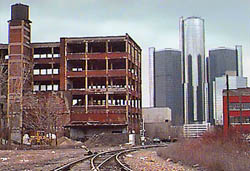Digital Monuments to the Urban Past
By JASON CHERVOKAS & TOM WATSON
...In
Detroit, Lowell Forest Boileau shares the fascination with urban
ruins and like Buehler, he has taken his vision to the Web. The Fabulous
Ruins of Detroit captures what's left of the Motor City's golden age
earlier this century.
"I
did this site from the heart," says Boileau, a painter based in
the city. "Over the years, I have painted a number of these settings
and have had a long interest in their symbolism of the transformation
of the industrial age to the information age. As such I have enjoyed
a spectacular front row seat here in Detroit."
 Credit: Lowell Boileau Credit: Lowell Boileau
Detroit's
shining Renaissance Center rises above the ruins of the city's
industrial beginnings. |
The
site is filled with the physical decline of a society built on what
was once a new and exciting technology -- like a glimpse at Palo Alto
or Seattle in the 2040s. From the crumbling late 19th century mansions
of the Brush Park neighborhood near the city's downtown, to the "factory
that changed the world," Henry Ford's Model T plant, still in partial
use as a warehouse, there is a definite sense -- conveyed along the
circuits of the hottest technology of the moment -- that the term "modern
technology" should always be viewed in a wider context.
The
buildings' "pathetic decline, in comparison to the reverence with
which ruins are worshipped in other places in the world, provides a
picture of the attitudes of our times as well as providing the ironic
twist so useful in artistic expression," says Boileau, who shies
away from the tag of preservationist. "Many of them are, to me,
glaring symbols of corporate greed whose abandonment has humbled a once
great city and hinders its comeback. What really attracts me is their
visual presence and immensity. They are simply awesome in their deliquescence
and the artist inside me stands agape before them."
As
is always the case with the Web, however, these digital monuments to
the urban past don't stand isolated like the buildings they portray.
Thousands of people visit, and they react. Most often, it's people who
know the settings well -- World's Fair visitors, former factory workers,
people who grew up in the shadow of the buildings in different eras.
Boileau,
who receives many notes from former Detroit residents, got this one
recently from a Web surfer who was entranced with the site: "I
returned to my hometown a few years ago after having been gone for 15
years. Retracing my Detroit roots proved Thomas Wolfe's axiom that you
can't go home again. In this case this is because home is no longer
there."
Jason Chervokas & Tom Watson at nation@nytimes.com
welcome your comments and suggestions.
Copyright 1998 The New York Times Company
Full
Article »
|